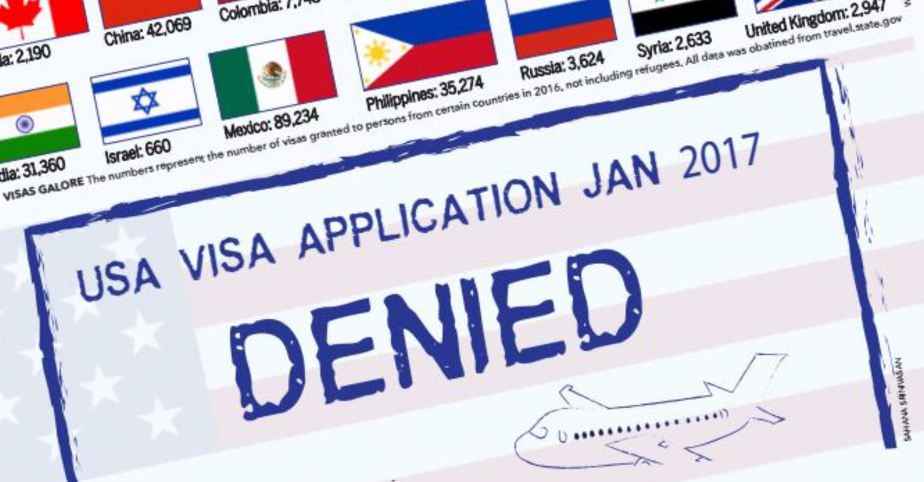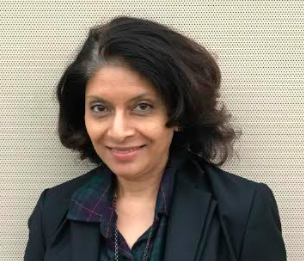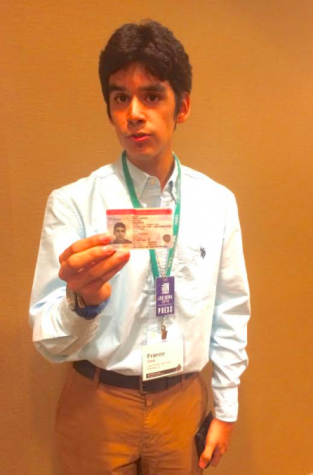Trump administration promises immigration policy overhaul
"I'm scared for you guys." Harker community members tell immigration stories.
January 25, 2017
Anita Chetty
The importance of immigration:
“Living in the Bay Area, where would we be without immigration? I think that it’s very dangerous to become very inclusive and to think that what you have within your own borders is enough. It’s extremely important to bring people in. … The thing that inspires me the most about California is all of these people and all of their stories and the things that they have done. So many of the people that live here didn’t have a privileged beginning.”
What future immigration policies should consider:
“I think that you have to look outside your borders. We are a planet. We are not one country, this one isolated country. You can’t look at yourself that way; it won’t work for too long. I’m concerned, and I know all my students came to me the day after [Trump] was elected and said, ‘When are you moving? You still have a house up there in Canada, right?’, and I said, you know, ‘This is my home now.’ But it scares me. I am scared for the future. I’m scared for you guys.”
Nasty Grebin (11)
The reason she immigrated:
“Political corruption, inferior universities, restricted civil liberties. My parents wanted their children to have the best possible education and live in a country where a presidential candidate cannot be thrown into jail after a mockery of a trial. The U.S. was just a symbol of a better future for them, so here we are now.”
Some problems for immigrants:
“The fact that my ethnic diaspora in Bay Area is incredibly small also adds a feeling of isolation. Cultural heritage that dates back thousands of years has always been a part of my identity, and now I feel cut off from my own people and from everything that basically defines me as a Ukrainian. I think that is why I tend to quickly relate to other immigrants, wherever they come from—I know they experience something similar. They can understand that slight change in people’s behavior when they realize you have an accent.”
Ben Yuan (10)
How he overcome the struggle of many immigrants:
“I feel like I am stuck in the middle. Chinese people think I’m American, and American people think I’m Chinese, but it doesn’t bother me at all. I’m both, and I’m comfortable being both, and accepting and understanding two very different cultures gives me perspective when it comes to a lot of issues.”
What is his future:
“Perhaps if there are more job opportunities, I will consider moving back. It’s still where I came from—I definitely have a reason to go back, but if the economy doesn’t improve and if the environment gets worse and worse, then maybe not.”
Jack Jia (9)
What he misses about home:
“The first thing [I miss about home] is definitely food. What I miss is not really about my home country but it’s actually the city where I’m from. Different cities in China have totally different placement of the buildings, so I’m just kind of used to staying at a city like Shanghai, but I need to get used to it.”
Transitioning into a new environment:
“The first few days, it takes a little time to get into the language environment. After that, it is not much of a problem for me, but it definitely takes some time to adjust to the different style of living here, and even if you want go to the supermarket it is all different. Here, you need a car to go anywhere.”
Jessica Pan (10)
How she integrated into our community:
“I spoke another language in a different country, but here I realized that what you actually communicate is on a cultural level. You watch different TV shows, different music, and have different likes and dislikes. Once you have friends here, they’ll tell you what they like, they’ll share their feelings and it will become easier to become integrated into society.”
What our future holds:
“My family watched the election and [Trump’s] speeches, and it shocked me, but I cannot understand why it’s happening. It makes me feel nervous and anxious, because I don’t know what’s going to happen next to me, to the immigrants. I’m nervous and not really confident in the situation. I’m pretty sure that before the election, this situation would have never come to my mind, but after this, we have to think about how to protect our own rights.”
Trump administration brings new policies, activists and immigrants’ rights groups speak out
Friday marked the inauguration of President Donald Trump as the U.S.’s 45th commander in chief. Last fall’s election of a Republican-majority Congress in conjunction with Trump’s own Republican administration heralds a shift in official policy on some of the most oft-debated topics in American politics, including foreign policy, gun control, abortion and immigration.
President Trump’s stance and proposed policies on immigration have been widely publicized by the media for over a year and currently he has a 10-point plan for his administration.
According to the official policy listed on his website, his primary concern is to build a physical wall between the U.S. and Mexico, paid for by Mexico, beginning on “day one.” He also wants to focus on deporting all undocumented immigrants with a criminal record.
Other initiatives on his 10-point plan include ending sanctuary cities, tripling the number of Immigration and Customs Enforcement agents, ending former President Obama’s executive amnesties and suspending visas from countries for which the U.S. does not have sufficient screening.
Juan Escalante, an immigrant from Venezuela, is the digital campaigns manager for America’s Voice, an organization aiming to enact immigration policy change.
“[Trump] ran his campaign on the basis of demeaning immigrants like myself, and what’s really at stake here is the safety and security of immigrants all across the country,” Escalante said.
“His promise of mass deportation and his rhetoric sparks fear and anxiety amongst millions of individuals across this country who are hardworking, law-abiding Americans. A lot of the plans Trump is proposing are not only unworkable but costly for taxpayers and people who want to see this country improving, and the only way to do that is to make sure that immigrants remain in this country—remain with their families—and to not criminalize them.”
Escalante entered the country when he was a teenager and is one of the over 800,000 estimated people in the country whose rights are maintained under the Deferred Action for Childhood Arrivals (DACA) act, a policy implemented by the Obama administration in 2012. DACA is intended to protect immigrants who entered the country as minors under the recognition that they grew up predominantly in America.
The program, which grants childhood arrivals renewable rights such as work eligibility and deferred action from deportation, is acknowledged by immigration reform advocates as Obama’s principal immigration policy achievement.
Cathleen Farrell, an immigrant from Canada, is the chief media executive at the National Immigration Forum, a center for social justice that backs immigrants’ rights.
“These young people have no recollection of another country. This is their country: they went to school here, they’re involved in the community here and they’re making valuable contributions,” Farrell said. “[DACA] is a way to protect these people and to give them the ability to study and work here legally.”
The DACA act now faces the threat of revocation under the Trump administration.
“The repeal of the DACA program could have a negative impact on hundreds and thousands of lives, and could also impact our economy negatively,” Escalante said. “DACA should be kept in place. It has benefited countless people across this country.”
Franco Vidal, 18, is an undocumented immigrant student who attends California State University and is part of the DACA program. The Winged Post interviewed him last April when he was a senior at John W. North High School in Riverside.
“I was the first of my family of four to move a step further towards citizenship, and my father was proud of me, my mother was proud of me [and] everyone in my family who’s known me and even people who heard my name were proud of the accomplishments I’ve done,” he said. “This was a huge stepping stone to me and reminder that I can’t just quit … I’ve made it this far; I can’t quit now.”
Yet, the DACA act protects only a part of the undocumented immigrant population. From 2009 to 2015, over 2.5 million people were removed from the country.
In response, attempts at reform in recent years have revolved around the rights of all those entering the country, including undocumented adults who leave their home country due to conditions like violence or food shortages.
“My parents had the hindsight to see what was happening to their country—a country that currently doesn’t have enough power to serve its hospitals, a country that is home to one of the most dangerous cities in the world, a country where shortages of food were common and basic goods are a rarity,” Escalante said. “That is the kind of reality that a lot of people don’t conceptualize when they think of immigrants: that they’re fleeing from conditions and they’re willing to come here and work hard and do right by this country in exchange for an opportunity.”
Many seeking these opportunities find work in America, resulting in immigrants, both documented and undocumented, constituting a significant portion of the labor force.
According the the Bureau of Labor Statistics, immigrants, including American citizens, other documented immigrants and undocumented immigrants, comprised 16.7 percent of the U.S labor force in 2016. According to the Pew Research Center, undocumented immigrants made up five percent of the U.S. labor force in 2014.
Various pro-immigration organizations have focused on immigrants’ contributions in their advocacy, aiming to promote their value to the country in order to achieve reform.
“Even though a lot of [immigrants] might not have papers, they bring skills and talent and life experiences,” Farrell said. “Unemployment rates amongst immigrants are typically much much lower than the general population because immigrants come to work, and the only way you can survive as an immigrant is by working.”
According to the Bureau of Labor, the unemployment rate among all U.S. immigrants in 2015 was 4.9 percent, whereas the national unemployment rate averaged 5.3 percent.
While organizations such as the National Immigration Forum support the rights of all people entering the U.S., others take a more conservative approach.
The Center for Immigration Studies, a District of Columbia-based think tank and research center that promotes tighter immigration enforcement and border control, is on the forefront of the movement against immigration reform and aligns itself with several of Trump’s presented policies on the subject.
“Restoring immigration enforcement will be one step towards fixing the trust gap between the public and all of our institutions, and it will also contribute to a tightening labor market,” Center for Immigration Studies veteran director Mark Krikorian said. “What Trump is proposing is a return to standard immigration enforcement practices so that [undocumented immigrants] who come into contact with law enforcement are, indeed, deported.”
Franco Vidal: DACA Student, Peruvian immigrant
Franco Vidal is a freshman at California State University. He is also an undocumented student covered under Deferred Action for Childhood Arrivals (DACA).
Franco Vidal is a freshman at California State University. He is also an undocumented student covered under Deferred Action for Childhood Arrivals (DACA).
Winged Post: What’s your opinion on Trump’s immigration policies?
Franco Vidal: I believe that President-Elect Donald Trump needs to firmly and as soon as possible give out a firm and detailed plan as to what he plans to do as far as immigration reform. We have very limited information as to what exactly he intends to do… I know there’s bad illegal immigrants out there. Of course there’s criminals. But most of all, to put us all in a bag, that’s what’s wrong. That’s what we want to know as people. We’re not illegals; we’re simply undocumented. We want to know what’s going to happen, and whether he will be able to protect our rights—our unalienable rights.
WP: How have you seen public opinion in your community about immigration change over course of election?
FV: [California is] a very progressive blue state, and I believe among the people that I know, the community that I surround myself with, they understand that America has this immigration problem, so to say… People have come here for generations and are still struggling to become citizens. That’s the real key, that’s the real problem. There shouldn’t be an extreme solution to something so serious, and yet, on the other side, since the election came to a close and President-Elect Trump was officially going to swear in the presidency on the 20th, a lot of people, a lot of close friends who I knew, one way or another, spoke their platform, and it’s–so the difficult thing for me to grasp [that] some you’ve known since elementary school, people you’ve grown up with, and people whom know your status, people whom have seen you, who know your family… completely rejects your way of living.
This piece was originally published in the pages of The Winged Post on January 24, 2017.






